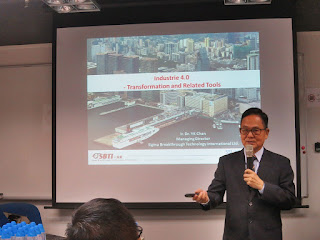I attended
Minitab Seminar entitled “Data driven Business toward Excellence” (營之以據,邁向卓越)
on 1st Sep 2017. Before the seminar, I took a photo with Ir. Dr. YK
Chan (Chairman, Six Sigma Institute (SSI)) in his office for memory.
In
the beginning, Ms. Iza Ng (Business Development Manager, Techmax Information
Technology (HK) Ltd.) and Mr. Alex Kwan (Country Account Manager, Minitab)
introduced the background on Minitab and guest speakers.
The
first guest speaker was Mr. Ming Dong (Senior Technical Training Manager,
Minitab Australia) and his topic entitled “Using DOE in Transactional Businesses”.
Firstly, he briefed transactional businesses included Banking/Financial, Food
and Beverage, Healthcare/Hospitals, Mailing & Publishing and Government,
etc.
Then Mr. Dong briefed different quality improvement opportunities in transactional businesses such as Wrong prescriptions in Healthcare, Credit cards service in Finance/Banking, Time for permits in Government and Design of job posting template in HR, etc. After that he introduced different statistical tools for service quality project use included Hypothesis test, Regression, Gage R&R, Control Charts, Capability and DOE, etc.
Mr.
Ming Dong explained the objectives of experimental study. It aimed to identify the most influential variables
that easily collected information and drawn conclusions; to assess the impact
of a factor and using simple statistics to interpret an empirical model. Moreover, Mr. Dong said a designed experiment
was under controlled environment that led a cause and effect statements. But the observation data (or historical data)
was able to demonstrate the relationships between factors and the response but
not necessary had a cause and effect statements.
After
that Mr. Dong mentioned some applications of DOE such as Customer surveys, Debt
collection, Assessing training needs in a government agency and increased
efficiency. Then he demonstrated some example
such as the training to be three factors (Content, Speakers and Timing) with
two levels, totally 8 combinations (23).
Using
DOE analysis, it could demonstrate which strategy was the best one to perform
in next time.
Finally,
he also discussed Logistic Regression which was for binary response (two
possible outcomes) that model the probability of observing an event. Lastly, he summarized that transactional
businesses were still built on process so as to have many opportunities for DOE
application. Main effects and
Interaction plots were useful tools so that it was not necessary to use all of
the high-power DOE tools.
The
second guest speaker was Ir. Dr. YK Chan (Chairman, Six Sigma Institute (SSI))
and his presentation topic named “Industrie 4.0 – Transformation and Related
Tools”. (where Industrie – German; Industry – English). The seminar objectives were to share
Industrie 4.0 and Made in China 2025, how to implement Industrie 4.0 included
Cyber transformation and Management transformation.
Firstly,
Dr. YK Chan briefed the background of Industrie 4.0 from the history of industrial
revolution waves. Now the fourth
industrial revolution is coming. There
were different names with same idea such as Make in China 2025, Smart Factory,
Smart Manufacturing, Industrie 4.0, Integrated Industrie, Internet of Things, etc.
Then
Dr. Chan mentioned the roadmap of Industrie 4.0 from Laboratory Solution
(Today) to Isolated / selective pilot installation (~2018~2020), to Broad
adoption of standard solutions (~2020~2025) and then Transition to “True
Industrie 4.0” (~2025+/~2030+). The
objectives for Industrie 4.0 were Cost Reduction (43%), Sales Increase with New
Product (32%), and both Sales increase and Cost reduction (14%) from the survey
of 100 top managers.
Implementation of Industrie 4.0 included Cyber and
Management Transformation. For Cyber
Transformation, it was interlinking of real (physical) and virtual (cyber)
world to form Cyber-Physical System (CPS).
Some tools for Cyber Transformation were introduced including advanced
robotics and AI, sophisticated sensors, cloud computing, IoT, data capture and
analytics, 3D printing and new marketing models, etc.
The
6 steps to achieve Industrie 4.0 were stated as following diagram.
And then Dr. Chan described the Management Transformation which started from value driver.
The
6 steps with relevant tools for Management Transformation were discussed.
Finally,
Dr. Chan proposed a new Management Model named “TOCLSS” which integrated “Lean”,
“Six Sigma” and “TOC” together to prepare for Industrie 4.0. Each tools had their specific application as
follows:
i)
Theory
of Constraints (TOC) – increase system Flow Rate (Throughput) by focusing on
exploiting, protecting and elevating system constraints
ii)
Lean
Management – reducing Flow Time (Lead Time) of Value by focusing on eliminating
wastes (time traps and unnecessary costs) through the value chain
iii)
Six
Sigma – improve quality and Flow Rate of Value by focusing and eliminating
variations and improve process control throughout the value chain.
Lastly,
Dr. Chan concluded the holistic improvement in Flow, Quality and Capacity, as
well as, enhancing employee competence through TOCLSS tools. SSI had provided coach program for senior
manager and comprehensive training on TOC, Lean and Six Sigma to assist company
transformation.
Reference:
Minitab
– www.minitab.com
SSI
– http://www.sixsigmainstitute.org/















沒有留言:
發佈留言